
Electronic Journal of e-Learning
Scope & Guideline
Unlocking Potential Through Open Access to e-Learning Discoveries
Introduction
Aims and Scopes
- E-Learning Technologies and Tools:
This area examines the development and application of various e-learning tools, including Learning Management Systems (LMS), mobile-assisted learning, and gamification elements, to enhance educational experiences. - Pedagogical Approaches to Online Learning:
The journal emphasizes research on effective teaching methods in online environments, including self-regulated learning strategies, collaborative learning, and the integration of educational theories into digital formats. - Impact of Digital Transformation on Education:
Research in this scope investigates how technological advancements, such as Artificial Intelligence and online assessment systems, influence educational practices and learner engagement. - Inclusivity and Accessibility in E-Learning:
EJEL highlights studies focused on improving access to education for diverse learners, including those with disabilities, through adaptive learning technologies and inclusive pedagogies. - Evaluation and Quality Assurance in E-Learning:
This area focuses on methods and frameworks for assessing the quality and effectiveness of e-learning programs, including learning analytics and performance metrics.
Trending and Emerging
- Artificial Intelligence in Education:
The integration of AI technologies, such as ChatGPT, for personalized learning experiences and feedback mechanisms is rapidly gaining attention, highlighting the potential of AI to transform educational practices. - Hybrid and Blended Learning Models:
Research exploring hybrid and blended learning approaches is on the rise, particularly in response to the COVID-19 pandemic, as educators seek to combine the benefits of online and face-to-face instruction. - Gamification and Engagement Strategies:
There is an increasing focus on gamification as a strategy to enhance learner engagement and motivation, with studies investigating its effectiveness in various educational contexts. - Digital Citizenship and Inclusivity:
Emerging themes around digital citizenship, particularly for underrepresented groups such as hearing-impaired learners, reflect a growing commitment to inclusivity and equitable access to education. - Learning Analytics and Data-Driven Insights:
The use of learning analytics to monitor and improve educational outcomes is a trending theme, as researchers explore how data can inform teaching practices and enhance learner success.
Declining or Waning
- Traditional Classroom Comparisons:
Research comparing online and traditional classroom settings has decreased, likely due to the widespread adoption of online learning methodologies post-COVID-19, making such comparisons less relevant. - Generalized E-Learning Challenges:
There has been a reduction in studies that broadly address challenges in e-learning without specific context, as the focus has shifted towards more targeted investigations and solutions. - Static Learning Models:
Research that relies on static models of learning, without considering the dynamic and evolving nature of digital education, is less prevalent as scholars seek to explore more adaptive and flexible approaches. - Narrow Focus on Technological Tools:
While technology remains a core focus, the exploration of specific tools without context or pedagogical integration is declining, as there is a stronger emphasis on holistic educational frameworks. - Limited Scope of Language Learning:
The focus on language learning through traditional methods is waning in favor of more innovative, technology-enhanced approaches, including the use of AI and gamification.
Similar Journals
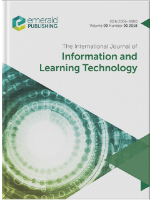
International Journal of Information and Learning Technology
Empowering Educators with Pioneering ResearchInternational Journal of Information and Learning Technology is a pivotal publication in the fields of computer science and education, published by the esteemed Emerald Group Publishing Ltd. With an ISSN of 2056-4880, this journal has positioned itself as a valuable resource, reflecting a commitment to high-quality research and discourse in information technology and learning methodologies. Recognized for its significant contributions, it holds a respectable Q2 ranking in both Computer Networks and Communications and Computer Science Applications, along with a prestigious Q1 ranking in Education for the year 2023. The journal spans an expansive converged period from 2015 to 2024, providing an extensive archive of innovative ideas and findings that are instrumental to researchers, educators, and IT professionals alike. Although currently not open access, the publication remains vital to the academic community, ensuring that cutting-edge research and discussions continue to inform and inspire advancements in the integration of technology within learning environments. From its base in Leeds, United Kingdom, the journal invites submissions that explore the nexus of technology and education, fostering a deeper understanding of how digital innovations can enhance teaching and learning experiences.
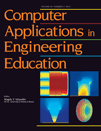
COMPUTER APPLICATIONS IN ENGINEERING EDUCATION
Transforming educational landscapes with cutting-edge computer science.COMPUTER APPLICATIONS IN ENGINEERING EDUCATION, published by Wiley, is a leading journal dedicated to the intersection of computer science and engineering education. With its ISSN 1061-3773 and E-ISSN 1099-0542, this journal has become a vital resource since its inception in 1992, providing valuable insights and advancements within its scope. Renowned for its high impact, the journal is categorized in the Q1 in Education and Q1 in Engineering (miscellaneous) quartiles, reflecting its significant contribution to the fields of education and engineering. The journal holds impressive Scopus rankings, including Rank #41 in General Engineering and Rank #38 in General Computer Science, positioning itself within the top echelons of relevant academic disciplines. Although it is not currently an open-access publication, it provides researchers, educators, and students with a platform to explore innovative computer applications in engineering contexts. This journal not only serves as a repository of knowledge but also fosters a community for professionals interested in enhancing educational methodologies through technology.
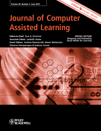
JOURNAL OF COMPUTER ASSISTED LEARNING
Advancing Learning with Innovative ResearchWelcome to the JOURNAL OF COMPUTER ASSISTED LEARNING, a premier publication dedicated to the advancement of research in the fields of computer science applications, education, and e-learning. Published by WILEY, this journal has earned a prestigious reputation, holding a Q1 quartile ranking in both its primary categories for the year 2023. With its extensive reach since its inception in 1985, it features cutting-edge research that stimulates innovative practices in educational technology and pedagogical methods. Recognized for its impact with a remarkable Scopus ranking — 57th in Social Sciences/Education and 105th in Computer Science — the journal is a vital resource for scholars, educators, and practitioners looking to deepen their understanding of how technology enhances learning experiences. Although the journal is not open access, its commitment to quality research continues to resonate across the UK and globally, making it an essential platform for those engaged in enhancing educational outcomes through technology.

Education and Information Technologies
Unlocking potential through educational innovation.Education and Information Technologies, published by SPRINGER, is a leading journal dedicated to the intersection of educational practices and innovative information technologies. With an impressive impact factor and consistently ranked in the Q1 quartile across Education, E-learning, and Library and Information Sciences, this journal serves as an essential resource for researchers and professionals aiming to explore the dynamic landscape of educational technology. Spanning from 1996 to 2024, it provides a platform for high-quality, peer-reviewed articles that contribute to the evolving discourse in this critical field. The journal’s rigorous Scopus ranking, placing it in the top 4% of Social Sciences Education and top 6% in Library and Information Sciences, highlights its significance in advancing scholarly knowledge. While it offers various access options, the focus remains on delivering cutting-edge research that can inform teaching practices and technological integration in education, making it indispensable for students, educators, and technology developers alike.

E-Learning and Digital Media
Exploring the future of learning in a digital world.E-Learning and Digital Media, published by SAGE Publications Inc, is a premier academic journal dedicated to the innovative intersection of digital technologies and education. With a strong commitment to advancing research in the fields of education and computer science, this journal has established itself as a vital resource for researchers, professionals, and students alike. As of 2023, it proudly holds a Q2 ranking in both Computer Science Applications and Education, reflecting its impact and reach within the academic community. The journal encompasses a wide range of topics exploring the effectiveness and applications of e-learning technologies, pedagogical strategies, and digital media in educational settings. Since its inception in 2009, E-Learning and Digital Media has continuously contributed to the understanding and development of digital education, ensuring relevancy in an ever-evolving landscape. With an open access model intended to foster accessibility and dissemination of knowledge, this journal invites submissions that push the boundaries of traditional education through cutting-edge research and practice.
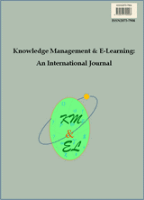
Knowledge Management & E-Learning-An International Journal
Bridging Knowledge and Technology for Tomorrow's Educators.Knowledge Management & E-Learning-An International Journal, published by the Laboratory Knowledge Management & E-Learning University in China, is a pioneering open-access platform that has been advancing the fields of education, e-learning, and technology management since its inception in 2009. With an ISSN of 2073-7904 and a commendable placement in the Q2 quartile across multiple categories including Education and Management of Technology and Innovation, this journal serves as a vital resource for researchers, educators, and practitioners seeking current insights and innovative methodologies in knowledge management and digital learning environments. Its recognition within Scopus, ranking 294th in Social Sciences Education and 106th in Business Management, underscores its significance and the impact of its contributions to the scholarly community. With a focus on fostering interdisciplinary collaboration and promoting the latest research findings, Knowledge Management & E-Learning remains committed to enhancing the dialogue on effective knowledge dissemination and digital pedagogies. Accessing its content is straightforward, as the journal has embraced an open-access policy, making research freely available to a global audience.

Smart Learning Environments
Exploring the future of educational innovation.Smart Learning Environments, published by Springer Heidelberg, is a leading open-access journal dedicated to advancing the field of educational technology and intelligent learning systems. Since its inception in 2014, this journal has established itself as a vital resource for researchers and practitioners, showcasing innovative interdisciplinary approaches that enhance learning experiences using smart technologies. With a notable impact factor and recognition in the top quartiles (Q1) of both Computer Science Applications and Education, it ranks within the top 2% of journals in the Social Sciences – Education category and the top 7% in Computer Science, according to Scopus. The journal's scope encompasses empirical studies, theoretical papers, and reviews, making it an essential platform for disseminating cutting-edge research. Researchers, educators, and technology professionals are encouraged to engage with this premier outlet, which not only facilitates access to high-quality research but also promotes collaboration across academic and professional spheres.

Pegem Egitim ve Ogretim Dergisi
Pioneering Research in the Heart of EducationPegem Egitim ve Ogretim Dergisi is a prominent academic journal published by PEGEM AKAD YAYINCILIK EGITIM DANISMANLIK HIZMETLERI TIC LTD STI, specializing in the field of education. Based in Turkey, this journal offers a platform for scholarly discourse, catering to both emerging and established researchers in the educational domain. With its ISSN 2148-239X, the journal aims to provide insights into contemporary educational practices, pedagogical innovations, and research findings that influence teaching and learning. Although classified in the Q4 quartile of the education category as of 2022 and achieving a Scopus rank of 1178 out of 1469, it remains a valuable resource for practitioners and academics alike. The journal ceased Scopus coverage in 2023, yet it continues to be a relevant outlet for educational research in Turkey and beyond. While it operates under traditional access models, the potential for collaborative research and knowledge sharing makes it a noteworthy choice for those engaged in the evolving landscape of education.

Eurasian Journal of Educational Research
Advancing educational excellence across Eurasia.The Eurasian Journal of Educational Research, published by ANI YAYINCILIK, is a distinguished platform dedicated to advancing the field of education since its inception in 2008. Operating under a robust commitment to open access principles, this journal facilitates the dissemination of high-quality research and innovative practices across diverse educational domains. With an ISSN of 1302-597X and an E-ISSN of 2528-8911, it serves as a significant resource for educators, researchers, and policymakers within the academic community. Holding a Q3 rating in Education for the year 2023, and ranked 792 out of 1543 within the Scopus database, the journal exemplifies its commitment to enhancing educational outcomes across Eurasia. The Eurasian Journal of Educational Research aims to publish original research, systematic reviews, and insightful perspectives that contribute to the ongoing discourse in educational research, policy, and practice. Based in Ankara, Turkey, it also emphasizes the importance of regional studies and their implications on global educational trends, thus enriching the academic landscape with localized knowledge while fostering international collaborative networks.
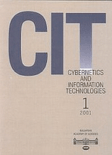
Cybernetics and Information Technologies
Fostering Collaboration in Cutting-Edge ResearchCybernetics and Information Technologies is a pivotal academic journal, published by the Institute of Information and Communication Technologies at the Bulgarian Academy of Sciences. With its Open Access policy established since 2012, this journal facilitates wide dissemination of cutting-edge research across the field of computer science, particularly in the intersections of cybernetics and information technology. Indexed in Scopus, it holds a commendable position within the Q3 quartile for 2023, ranking #103 of 232 in the category of General Computer Science, placing it within the 55th percentile and attesting to its growing influence among peer publications. The journal not only aims to publish high-quality research but also seeks to foster a collaborative platform for academicians, practitioners, and students to advance the domain of computational technologies. With a focus on innovative methodologies and applications, Cybernetics and Information Technologies remains committed to addressing current challenges and exploring the future landscape of technology and information systems.